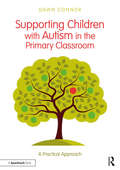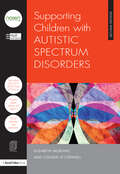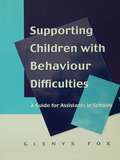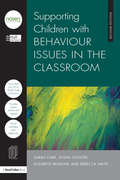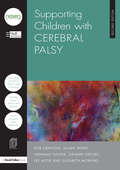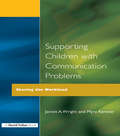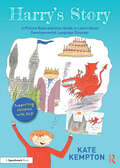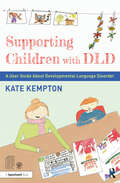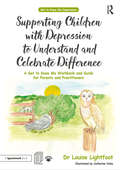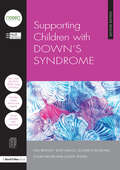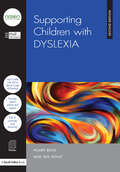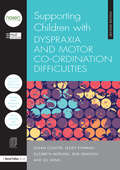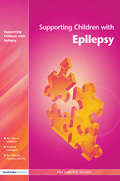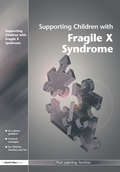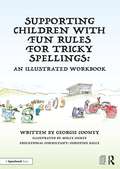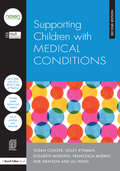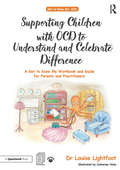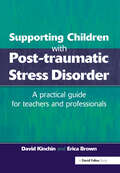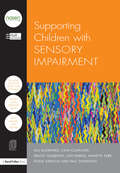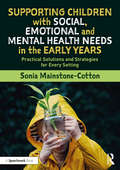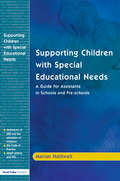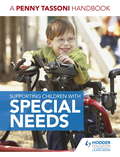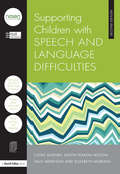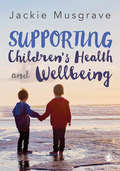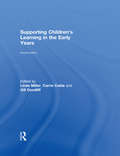- Table View
- List View
Supporting Children with Autism in the Primary Classroom: A Practical Approach
by Dawn ConnorThis invaluable resource offers a wealth of strategies enabling you to support children with autism in the mainstream classroom. Cutting through the jargon and recognising the huge variety of ways in which children’s perceptions, feelings and behaviours may be affected by autism, the text is packed with practical advice to help you create a classroom environment which will meet the needs of the individual child. Each chapter in the book addresses some of the most common social, practical and behavioural difficulties that a child with autism may face at school, and details tried and tested approaches for improving their experiences and outcomes in your classroom. Topics discussed include: classroom layout, timetables and rules effective communication supporting learning and setting targets breaks, unstructured times and school trips challenging behaviours Supporting Children with Autism in the Primary Classroom – A Practical Approach is a highly accessible resource which will give primary teachers, teaching assistants, SENCOs, and parents, the confidence and knowledge they need to support young children with autism.
Supporting Children with Autistic Spectrum Disorders (21st Century Business Management)
by Hull City CouncilThis practical resource contains a wealth of valuable advice and tried-and-tested strategies for identifying children and young people with Autistic Spectrum Disorders (ASD). This fully updated text describes the different types of difficulties experienced by pupils with ASD and helps practitioners to understand their diverse needs. This fully updated new edition explores key topics, including: organizing the classroom and support staff home-school liaison and working with siblings transition to adulthood independence skills whole school implications. Now fully updated in line with the SEND 2014 Code of Practice, this invaluable guide provides guidance and practical strategies for teachers and other professionals, helping them to feel more confident, and be more effective in supporting learners in a variety of settings. For professional development, this book also provides materials for in-house training sessions, and features useful checklists, templates and photocopiable/downloadable resources.
Supporting Children with Behaviour Difficulties: A Guide for Assistants in Schools
by Glenys FoxThis practical guide is written to help assistants in supporting children who have behavior difficulties. The author provides a description of the role of the assistant in working with the class teacher to enable children to learn good behavior in schools, a clear description of the range of behavior difficulties, and information on strategies that work in managing behavior. The book is relevant and useful for any assistant working directly with children, as all assistants in the course of their work need to develop a repertoire of effective strategies for managing behavior. It is particularly helpful for assistants who work routinely with children who present behavior problems as it guides understanding and provides a helpful framework for knowing where to start, what to do and how to do it. The book is also an invaluable resource in the training of assistants.
Supporting Children with Behaviour Issues in the Classroom
by Hull City CouncilThis completely revised edition is an easy to use resource for teachers, TAs and SENCOs concerned about behavioural issues in the classroom. It will support school staff in their approach to a range of behavioural issues, through a range of tried-and-tested strategies, including: How to create an environment of support and acceptance Techniques to provide an effective leaning environment Ways in which to communicate clearly with children with poor communication skills Whole class and whole school approaches for a positive learning environment How to maintain appropriate behaviours during unstructured break times This accessible reference tool will help any teacher to create and maintain a classroom environment conducive to learning. Packed with resources, it also includes templates and example Personal Support Plans, written by practitioners for practitioners.
Supporting Children with Cerebral Palsy (nasen spotlight)
by Hull City CouncilCompletely revised and fully updated in light of the 2014 SEND Code of Practice, this edition familiarises readers with the specific learning needs of cerebral palsy. Offering practical tips and tried-and-tested strategies from professional practitioners, this accessible guide provides advice on how to meet the needs of young people with cerebral palsy. This new edition presents all of the information practitioners will need to know to deliver outstanding provision for young people with cerebral palsy and support the inclusion of children and young people with cerebral palsy into mainstream schools. The far-reaching advice found within this guide includes: Planning for a pupil with cerebral palsy Accessing the curriculum, including specific advice on each subject area How to make effective use of support staff Developing independence skills Liaising between home and school Making the transition into adulthood With accessible materials, such as checklists, templates and photocopiable resources, this up-to-date guide will enable teachers and other professionals to feel more confident and effective in the support they can provide.
Supporting Children with Communication Problems: Sharing the Workload
by Myra Kersner Jannet A. WrightFirst Published in 1998. Routledge is an imprint of Taylor & Francis, an informa company.
Supporting Children with DLD: A Picture Book and User Guide to Learn About Developmental Language Disorder (Supporting Children with DLD)
by Kate KemptonThis picture book and guidebook set has been developed to help raise awareness of Developmental Language Disorder, and to highlight the impact of DLD from the child’s point of view. Harry’s Story introduces a child who faces daily challenges in school due to his language difficulties. It explores how these challenges are made easier by his teachers’ understanding and support as he finds new ways to communicate. Supporting Children with DLD provides essential information, prompts and suggestions for adults to help understand the experience of children with DLD. It offers supportive strategies and activities to help children express themselves effectively and ask for help when they need it. This resource can be used both directly with the child, to talk about and explore DLD, and also as a training tool with the parents and professionals who support them. With research suggesting an average of two children per classroom are affected by DLD, this is an essential set for parents and professionals looking to understand the condition.
Supporting Children with DLD: A User Guide About Developmental Language Disorder (Supporting Children with DLD)
by Kate KemptonFor effective use, this book should be purchased alongside the illustrated picture book Harry’s Story. Both books can be purchased together as a set, Supporting Children with DLD: A Picture Book and User Guide to Learn About Developmental Language Disorder [978-0-367-70920-4]. Supporting Children with DLD, has been developed to help raise awareness of Developmental Language Disorder, and to highlight the impact of the condition from the child’s point of view. With activities, prompts and sample questions, this is an essential resource to enable adults to understand the reality of living with DLD, helping children feel heard and respected, as well as providing a solid foundation for tailoring support to individual needs. Drawing on specific examples from Harry’s Story, the book does not assume any prior knowledge of DLD and is designed to offer the reader accessible information and practical advice, teaching as you go. This book: Highlights the link between spoken and written language, addressing the need to recognise the literary difficulties faced by children with DLD Provides practical activities and worksheets that can be used to help children express themselves and ask for help Offers strategies for supporting children’s understanding of language, based on common situations and experiences explored in Harry’s Story Written to be an accessible introduction to DLD and its effect on children’s lives, this is an essential resource for parents and professionals looking to understand the condition.
Supporting Children with Depression to Understand and Celebrate Difference: A Get to Know Me Workbook and Guide for Parents and Practitioners (Get To Know Me)
by Louise LightfootThe ‘Get to Know Me’ resources aim to support children, with those around them, who may have additional/special educational needs. They are designed to empower the professionals and adults who support those with identified needs. Developed by child psychologist Dr Louise Lightfoot, the series includes activities specific to anxiety, depression and Obsessive Compulsive Disorder (OCD). In supporting the social and emotional health of students, it equips them with the ability to thrive, personally and academically. This book has been created for key adults (teachers, therapists and parents) as a complement to the picture book and draw along versions of Silver Matilda – a traditional narrative story exploring thoughts, feelings and sensations experienced by many children with depression. The activities in this book offer practical tools and strategies to support the child and those around them in addition to the information specific to the condition to improve understanding of a child’s needs to promote empathy and acceptance. Picture book and draw along versions of Silver Matilda are available separately, and as part of the Get to Know Me: Depression set.
Supporting Children with Down's Syndrome (nasen spotlight)
by Hull City CouncilThis practical resource contains a wealth of valuable advice and tried-and-tested strategies for supporting children and young people with Down’s Syndrome. Fully updated with the 2014 SEND Code of Practice, this text describes the different types of difficulties experienced by pupils with Down’s Syndrome and helps practitioners to understand their diverse needs. The wide-ranging chapters explore a variety of topics, including: Defining the profile of a pupil with Down’s Syndrome Guidelines for working with pupils Addressing behaviour issues The use of ICT Home/school liason Assessment It provides guidance and practical strategies for SENCOs, teachers and other professionals and parents, helping them to feel more confident, and be more effective in supporting learners in a variety of settings. It also provides materials for in-house training sessions, and features useful checklists, templates and photocopiable resources.
Supporting Children with Dyslexia (nasen spotlight)
by Hull City CouncilCompletely revised and updated in light of the new 2014 SEND Code of Practice, this second edition of Supporting Children with Dyslexia provides valuable advice and resources for teachers, TAs and SENCOs supporting pupils on the dyslexic spectrum. This practical resource will help those who are looking for expert guidance and strategies, as well as providing a professional development tool which will encourage outstanding practice at all levels. Spanning pre-school, primary and secondary teaching, this book covers the key areas to be considered when supporting pupils with dyslexia, including: how to identify a young person with dyslexia practical strategies for pre-school, primary and secondary settings useful advice to give to parents and carers of children and young people with dyslexia useful materials for continual professional development. Featuring helpful checklists, templates and photocopiable resources, this book provides guidance and practical strategies for identifying and supporting young people with dyslexia that will be of use to teachers, TAs, SENCOs and other educational professionals.
Supporting Children with Dyspraxia and Motor Co-ordination Difficulties (nasen spotlight)
by Hull City Council Susan Coulter Lesley Kynman Elizabeth MorlingCompletely revised and updated in light of the new SEND 2014 Code of Practice, this new edition supports teachers in making good provision for children and young people with a range of co-ordination difficulties. Offering practical tips and strategies on how to meet the needs of children and young people with dyspraxia and other coordination difficulties in a range of educational settings, this book features timesaving checklists, templates and photocopiable resources to support professional development. The wide-ranging and accessible chapters explore topics including: Identification of different types of motor co-ordination difficulties Implications for classroom practice Understanding core skill development Assessment practices Written by practitioners, for practitioners, it also contains a wealth of tried and tested strategies and provides clear best-practice guidance for developing outstanding provision in inclusive settings. Susan Coulter – Senior Support Teacher for the Education Service for Disability at Hull City Council, UKLesley Kynman - Senior Support Teacher for the Education Service for Disability at Hull City Council. UKElizabeth Morling - SEN consultant and series editorRob Grayson – Team Leader, Integrated Physical and Sensory Services at Hull City Council, UKJill Wing – Senior Support Teacher, Integrated Physical and Sensory Services at Hull City Council, UK
Supporting Children with Epilepsy
by Hull Learning ServicesOff-the-shelf support containing all the vital information practitioners need to know about Epilepsy, this book includes * Different types of seizures and what causes them * What to do when a person has a seizure * Advice on how to address school issues * Organizing out of school activities
Supporting Children with Fragile X Syndrome
by Hull Learning ServicesOff-the-shelf support containing all the vital information practitioners need to know about Fragile X Syndrome, this book includes: * Definition of Fragile X Syndrome and its educational implications * Ideas on how to improve access to the curriculum * Advice on how to manage support staff * Guidance on coordinating home and school liaison
Supporting Children with Fun Rules for Tricky Spellings: An Illustrated Workbook (Fun Rules for Tricky Spellings)
by Georgie CooneyThis illustrated workbook has been created to support learners who, after acquiring the basics of reading and writing, have struggled to organically grasp the rules that govern spelling in the English language. Each photocopiable worksheet is designed to support a key spelling rule, explored in the colourful storybook Who Put the Spell into Spelling? This activity workbook is designed to be used alongside the storybook. Key features include: Twenty-two activity worksheets designed to help learners understand and practise key spelling rules Activities designed to support skills in reading, spelling and writing Quirky illustrations designed to make the rules come to life Developed with feedback from teachers and students, this is an invaluable resource for teachers and parents looking to support learners who find spelling a challenge, or who are learning English as an additional language.
Supporting Children with Medical Conditions (nasen spotlight)
by Hull City CouncilThe fully revised new edition of Supporting Children with Medical Conditions provides teachers and practitioners with a reference to medical conditions most commonly found amongst school-aged children, including asthma, cerebral palsy, cystic fibrosis, eczema, epilepsy, head injuries, heart conditions, hydrocephalus and spina bifida. With up to date advice for practitioners, each condition is clearly described in terms of causes, symptoms and treatment, and the authors accessibly explain the educational implications – what teachers and support staff should be aware of, how they can minimise pupils’ difficulties in school and maximise access to the curriculum. With all the vital information practitioners will need to know about Medical Conditions, this book includes: Definitions of different Medical Conditions and their educational implications Guidelines for staff providing intimate personal care for pupils Suggestions to allow pupils to have full access to the curriculum Fully updated with the 2014 SEND Code of Practice and the guidance published in 2014 on ‘Supporting pupils at school with medical conditions’, this text will help professionals be more effective in supporting learners in a variety of settings. It also features useful checklists, templates and photocopiable resources.
Supporting Children with OCD to Understand and Celebrate Difference: A Get to Know Me Workbook and Guide for Parents and Practitioners (Get To Know Me)
by Louise LightfootThe ‘Get to Know Me’ resources aim to support children, with those around them, who may have additional/special educational needs. They are designed to empower the professionals and adults who support those with identified needs. Developed by child psychologist Dr Louise Lightfoot, the series includes activities specific to anxiety, depression and Obsessive Compulsive Disorder (OCD). In supporting the social and emotional health of students, it equips them with the ability to thrive, personally and academically. This book has been created for key adults (teachers, therapists and parents) as a complement to the picture book and draw along versions of Tidy Tim – a traditional narrative story exploring thoughts, feelings and sensations experienced by many children with OCD. The activities in this book offer practical tools and strategies to support the child and those around them in addition to the information specific to the condition to improve understanding of a child’s needs to promote empathy and acceptance. Picture book and draw along versions of Tidy Tim are available separately, and as part of the Get to Know Me: Obsessive Compulsive Disorder (OCD) set.
Supporting Children with Post Tramautic Stress Disorder: A Practical Guide for Teachers and Profesionals
by Erica Brown David KinchinIt is estimated that at any one time around 135,000 school children are suffering from post-traumatic stress disorder (PTSD). They may be survivors of abuse (physical, emotional or sexual) or bullying. Some may have been involved in a road accident, an accident at home or any other traumatic event. This book provides teachers, support staff and other educational professionals with the information they need to, really understand the implications of PTSD, ably and effectively support and educate a traumatized child, address questions such as what can cause PTSD in young people? and understand how PTSD might affect the education of children at school.
Supporting Children with Sensory Impairment (nasen spotlight)
by Hull City CouncilThis book provides a quick and easy reference guide to different types of sensory impairment, including causes, symptoms and the implications on teaching and learning. With most children and young people with hearing or visual impairments attending mainstream schools, this book explains the most effective and practical strategies for use in mainstream classrooms. Fully up to date with the 2014 SEND Code of Practice, this accessible resource is split into two sections: Supporting Children with a Hearing Impairment and Supporting Children with a Visual Impairment. The wide-ranging chapters include: Educational access for pupils with hearing loss Teaching phonics Teaching deaf pupils with English as a second language Identifying children with visual impairment Classroom management Adapting resources This practical text provides strategies to use in schools to ensure that children with sensory impairments are fully supported. Featuring useful checklist and photocopiable resouces, it contains a wealth of valuable advice and tried-and-tested strategies for teachers and support staff working in early years settings, schools, academies and colleges.
Supporting Children with Social, Emotional and Mental Health Needs in the Early Years: Practical Solutions and Strategies for Every Setting
by Sonia Mainstone-CottonThis accessible book offers essential guidance and practical ideas for Early Years staff to support children with social, emotional and mental health (SEMH) needs. It draws upon a wealth of experiences and insights to explore what SEMH is, why children may have SEMH needs, and what this can look like, giving practitioners the confidence they need to understand early signals and signs. Chapters share practical tools, activities and strategies, exploring topics that include: environment routines and transitions sensory experiences feelings and emotions the role of the adult. A range of case studies and resource suggestions are woven throughout, bringing the theory alive with first-hand advice from a variety of professionals, including educational psychologists, play therapists and Forest School specialists. This book is a refreshing and practical guide, and an essential read for all Early Years practitioners looking to cultivate a supportive and compassionate environment.
Supporting Children with Special Educational Needs: A Guide for Assistants in Schools and Pre-schools
by Marian HalliwellFirst Published in 2004. Routledge is an imprint of Taylor & Francis, an informa company.
Supporting Children with Special Needs: A Penny Tassoni Handbook
by Penny TassoniSupport the individual needs of children with this practical and informative guide from Penny TassoniFully matched to the new 2014 Special Education Needs and Disability Code of Practice, this Penny Tassoni Handbook explores supporting children with individual needs, working with parents and the issues surrounding SEN and disability. Tassoni's signature style and approach ensures that the government code is translated into a practical, informative and easy-to-read guide for anyone working in the role of a SENCO.- Helps you tailor your strategies in the key areas of communication & interaction, cognition & learning, social, emotional & mental health and sensory and/or physical needs.- Includes a detailed reference section on a wide range of specific needs from autism spectrum condition through to Fragile X.- Uses colourful design and illustrative photos which make theory easy to understand and to put into practice in real world scenarios.- Written in Penny Tassoni's easy-to-read, informative and practical style.
Supporting Children with Speech and Language Difficulties (nasen spotlight)
by Hull City CouncilCompletely revised and updated in light of the new SEND 2014 Code of Practice, this new edition describes the different types of difficulties experienced by pupils with speech, language and communication needs. It will help teachers and other professionals to feel more confident by providing expert guidance and practical strategies, and as a professional development tool, will also encourage outstanding practice by suggesting ideas and materials for in-house training sessions. The wide-ranging and accessible chapters explore topics including: Listening skills Phonological awareness Comprehension of language Activities for circle time Working with parents Featuring useful checklists, templates and photocopiable resources, this practical resource contains a wealth of valuable advice and tried-and-tested strategies for identifying children and young people with speech, language and communication needs, ensuring they have the support they need to make exceptional progress.
Supporting Children's Health and Wellbeing
by Jackie MusgraveIn the recent years 'safeguarding' measures to ensure the health and wellbeing of all children has become an increasing focus in the early years. Supporting Children's Health and Wellbeing helps early years students and practitioners working with children and young people gain an understanding of the key issues relating to children’s health in particular, examining the possible ways in which health can impact upon young children’s early childhood education and care. Packed full of practical advice for the everyday realities of the early years classroom, topics discussed include: Historical perspectives and contemporary issues related to child health Current policy and legislation How to support the child and the family Nutrition in childhood Infectious diseases, infestations and the acutely ill child Children with chronic and complex medical conditions Coping with the death of a child A timely, topical text that will be invaluable to early years professionals. Jackie Musgrave will be discussing key ideas from Supporting Children’s Health and Wellbeing in the SAGE Early Years Masterclass, a free professional development experience hosted by Kathy Brodie. To sign up, or for more information, click here.
Supporting Children's Learning in the Early Years
by Linda Miller Carrie Cable Gill GoodliffSupporting Children’s Learning in the Early Years is aimed at early years practitioners who are developing their knowledge and understanding of professional practice through studying at undergraduate level. The book encourages readers to consider their professional development as reflective practitioners, building on and supporting the government agenda to provide quality provision for young children and their families. Combining theory and practice, and bringing together current research and thinking in a broad range of areas, the book covers: Learning environments: young children as learners, assessment of learning, well being and children’s rights, diversity and inclusion. Learning and development: children’s development including social and emotional development, literacy and mathematical development, the potential of ICT, fostering creativity, musical development and knowledge and understanding of the world. Reflective practice: the learning environment, safeguarding and wellbeing, the reflective practitioner. Throughout, the contributions in this book encourage the reader to consider the diverse range of experiences which young children bring to early years and early primary settings and suggest ways in which they can be supported. The book will also be a valuable and unique resource for training providers of a range of courses at further and higher education level that prepare people to work with, and lead in, early years settings in the UK.
